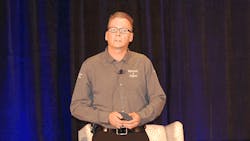Seven years ago, amid wild winds and unrelenting fog, Tom Wilson, the CFO of a large construction company in Edmonton, Alberta, climbed on a small plane with six other passengers. Some were his co-workers. He felt skeptical about the trip because the visibility was so low and they were to fly over the Vancouver mountains. Everyone on the plane seemed nervous, and the pilot even commented on the precariousness of the situation, offering to let anyone off the plane who felt uncomfortable about low-level flying.
No one asked to leave, the plane took off—and minutes later, Wilson heard a grinding sound and found himself in the trees, the plane burnt up around him. Everyone else on that plane was dead. “Not one person on that flight screamed anything—it was over that fast,” Wilson said.
Wilson publicly speaks about the crash, he says, as a way of dealing with grief and survivor’s guilt. He also hopes that his talk might inspire others to speak up in potentially hazardous situations and in the process prevent injuries and death.
The story of Wilson’s crash, his survival, and what he learned about safety and risk and bravery and courage resonated with the audience of safety managers this week at the Safety Leadership Conference in Greenville, S.C. Wilson gave the conference’s final keynote speech, “Sole Survivor: Moments of Impact.”
As he was recovering from the crash in the burn ward, Wilson had a lot of time to contemplate why he didn’t speak up. “I learned the difference between bravery and courage,” he told the hushed crowd. “Bravery is putting yourself physically at risk. We celebrate bravery. Courage is what we do internally when we recognize something is wrong. We may not take a physical risk, but we still take a risk.”
Wilson said he didn’t speak up because, ironically, he didn’t want to be perceived as cowardly. “It would have been courageous for me to speak up,” he said. “I believe every one of us was looking for someone to be courageous.” Because none in the group, though they might be quick to be brave, understood the importance of courage, “ultimately it cost seven people their lives.”
Wilson said he believes the pilot recognized the hazard of flying that day, but he could not properly assess the risk because he had been flying so long, he had a high risk tolerance.
“Risk tolerance is not hazard recognition,” Wilson said. “Most companies do an outstanding job of hazard recognition. We use all kinds of administrative controls to identify the hazards … but well over 50% of the injuries that take place in our workforce are from hazards we’ve already identified.”
The crash situation--from a pilot too willing to take on risk (the flight company had met with him three times to discuss concerns with his decision making) to passengers' worries about inconveniencing co-workers with a cancelled flight--checked off pretty much all the boxes for high risk tolerance, Wilson said.
“Beliefs, combined with competitive pressures and the difficulty of enforcement, lead to situations where some pilots and operators are willing to take risk by flying in marginal weather conditions,” he said. "Left unchecked, these practices become accepted norms and are adopted by new pilots.”
As part of his outreach work now, Wilson reviews all workplace accident reports in Alberta. Last year, 186 people there were killed in workplace accidents. “Ninety-nine percent could have been prevented” if the company and its workers had given recognized hazards the gravity they deserved.
“What haunts me the most is I didn’t speak up,” he concluded.
About the Author

Laura Putre
Senior Editor, IndustryWeek
As senior editor, Laura Putre works with IndustryWeek's editorial contributors and reports on leadership and the automotive industry as they relate to manufacturing. She joined IndustryWeek in 2015 as a staff writer covering workforce issues.
Prior to IndustryWeek, Laura reported on the healthcare industry and covered local news. She was the editor of the Chicago Journal and a staff writer for Cleveland Scene. Her national bylines include The Guardian, Slate, Pacific-Standard and The Root.
Laura was a National Press Foundation fellow in 2022.
Got a story idea? Reach out to Laura at [email protected]
